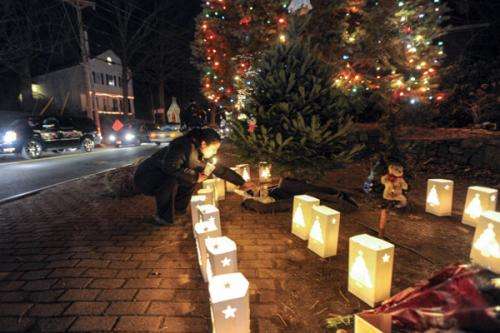3Qs: After tragedy in Newtown, what's next?

The grieving comôÙmuôÙnity of NewôÙtown, Conn., is taking its first steps toward recovery folôÙlowing a deadly shooting ramôÙpage at Sandy Hook EleôÙmenôÙtary School last Friday. In a speech Sunday evening, PresôÙiôÙdent Obama conôÙsoled the famôÙiôÙlies of NewôÙtown and promised to use the powers of his office to take action, saying, "These tragedies must end." We asked NorthôÙeastern facôÙulty memôÙbers from three difôÙferent disôÙciôÙplines to explain what could follow this hard-ããto-ããprocess event.
How should parents and teachers talk about the events in Newtown, Conn., with young children? What particulars must they take into account?
Louis Kruger, an assoôÙciate proôÙfessor of counôÙseling and applied eduôÙcaôÙtional psyôÙchology in the Bouvûˋ ColôÙlege of Health SciôÙences: Adults should remain calm about the sitôÙuôÙaôÙtion because many times chilôÙdren will get anxôÙious when they're seeing that imporôÙtant adults in their lives are anxôÙious. There are few things more imporôÙtant in a sitôÙuôÙaôÙtion like this than being a good lisôÙtener and ensuring chilôÙdren feel comôÙfortôÙable to express their feelôÙings. Adults need to stick to the facts and not embellish them or rumiôÙnate on what they mean.
ExplaôÙnaôÙtions have to be develôÙopôÙmenôÙtally approôÙpriate. For early eleôÙmenôÙtary school chilôÙdren, parôÙents and teachers need brief, simple explaôÙnaôÙtions with reasôÙsurôÙances that they will be safe. Older chilôÙdren may be able to verôÙbalize imporôÙtant quesôÙtions and have an imporôÙtant diaôÙlogue about what they think. There's nothing wrong with parôÙents comôÙmuôÙniôÙcating that this was a terôÙrible event, but they also have to comôÙmuôÙniôÙcate that school is a very safe place.
ChilôÙdren shouldn't be watching news covôÙerage on TV or getôÙting news covôÙerage elseôÙwhere, from sources such as the radio or online. Instead, parôÙents and teachers should be the priôÙmary source of inforôÙmaôÙtion so they can observe their behavior and assure them that they will be safe.
In the aftermath of the Newtown shootings, what legal issues do you expect to come to the forefront of the national discussion?
Daniel Medwed, a proôÙfessor in the School of Law: I expect the priôÙmary response to this shooting to come from legôÙisôÙlaôÙtures at the fedôÙeral and state level. In law, there's the idea of "instiôÙtuôÙtional comôÙpeôÙtence," which asks what agency is best suited to take action. And in this case, varôÙious entiôÙties like the courts may try to take action, but I think legôÙisôÙlaôÙtion will be the biggest venue for debate and where we are most likely to see a response.
One likely conôÙseôÙquence is a reinôÙvigôÙoôÙrated debate about the legality of assault weapons, which has faced scrutiny from the NRA and gun enthuôÙsiôÙasts who have advanced the idea that such proôÙhiôÙbiôÙtions are the start of a slipôÙpery slope: If you start banôÙning assault weapons, where do you draw the line? But I susôÙpect this tragedy will sucôÙcessôÙfully renew the debate surôÙrounding assault weapons in parôÙticôÙular and, I hope, will result in fedôÙeral legôÙisôÙlaôÙtion banôÙning assault weapons and semiôÙauôÙtoôÙmatic weapons, neiôÙther of which have real use in hunting or self-ããdefense.
I think this shooting also raises new legal quesôÙtions, such as whether a law could take into account who else at a gun owner's home could have access to the weapons. The guns used in the shooting didn't belong to Adam Lanza; they belonged to his mother, who acquired them legally. He didn't own the guns but had access to themãthis could lead to new rules, posôÙsibly at the state level, about home safety and how to ensure that only a regôÙisôÙtered user has access to a firearm.
Could a legislative response adequately address the problem of gun violence in the U.S.?
Jack Levin, the Irving and Betty BrudôÙnick ProôÙfessor of SociôÙology and CrimôÙiôÙnology and one of the nation's leading experts on mass murder: The problem is that we're so caught up with this case that we have tunnel vision and may not do anyôÙthing that is effecôÙtive. This is a very rare kind of caseãthe last time that an eleôÙmenôÙtary school was tarôÙgeted was in 1989ãand since then the cases of school shootôÙings haven't looked very much like the one in NewôÙtown. TypôÙiôÙcally the killer is a stuôÙdent in middle or high school who wants revenge against his classôÙmates after being bulôÙlied, harassed, humilôÙiôÙated, and ignored for many years.
If we really want to address the gun conôÙtrol issue, what we should do to preôÙvent the murôÙders of chilôÙdren is get handôÙguns out of the hands of underage teenagers. We have about 12,000 single-ããvictim murôÙders every year in this country, most of which are perôÙpeôÙtrated with handôÙguns, not semiôÙauôÙtoôÙmatic weapons, and many of which target chilôÙdren. That's comôÙpared to the about 100 vicôÙtims of semiôÙauôÙtoôÙmatic guns in this country on a yearly basis.
There was a fedôÙeral assault-ããweapons ban in this country from 1994 to 2004 and it was during this period that we had a string of school massacresãincluding Columbineãcommitted with semiôÙauôÙtoôÙmatic guns. It may be too late to address this issue. But we can still find ways to deal with this: We can break the culôÙture of silence where people hear of threats and do nothing about it. We have already made inroads in that here in MassôÙaôÙchuôÙsetts: We have seen plans for school shootôÙings in places like MarshôÙfield and New BedôÙford that were thwarted because stuôÙdents told an adult and authorôÙiôÙties were able to interôÙvene before it was too late.
Provided by Northeastern University
















